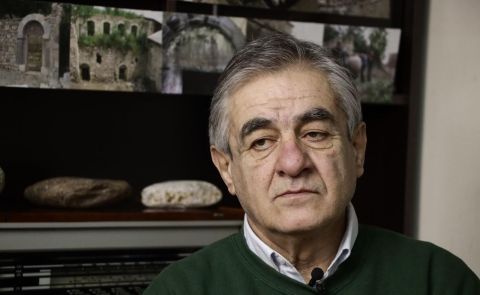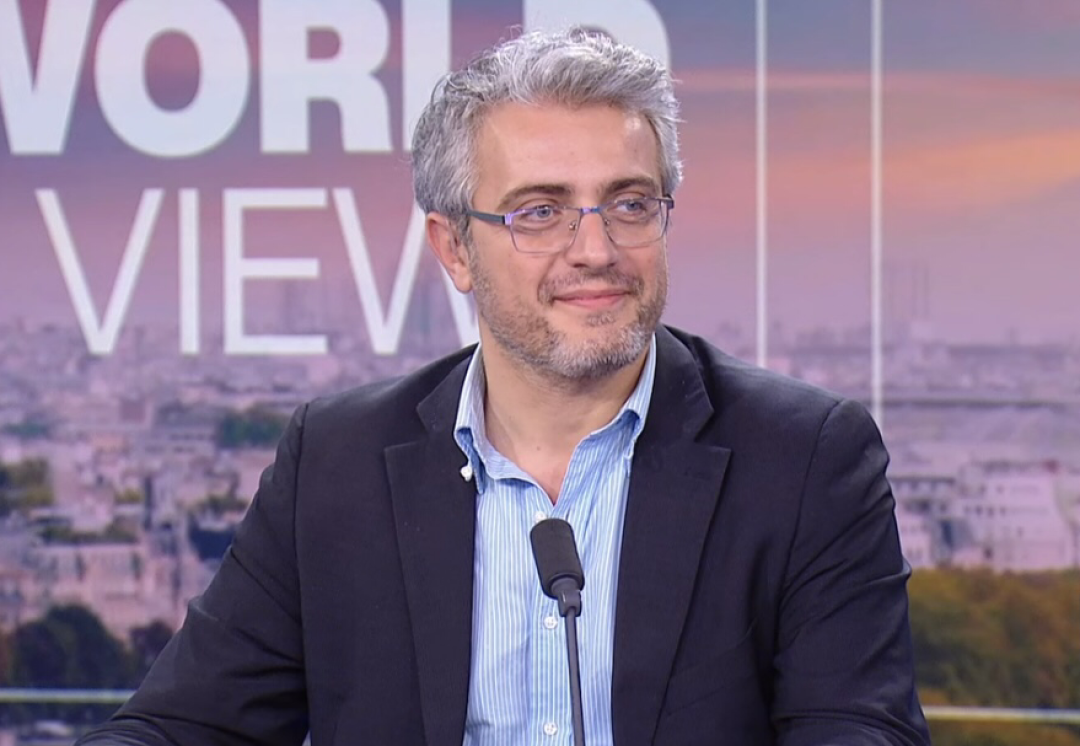
Thornike Gordadze: Ukraine Drains French Attention Away From the Caucasus

French involvement in the South Caucasus is greater than often appreciated. Paris has a considerable stake in one of the most promising oil and gas fields in the Caspian Sea, and it is looking to trans-Caspian trade to maintain a steady supply of uranium from Kazakhstan. Georgia has had a French President, Prime Minister, and Minister of Foreign Affairs, and wields considerable influence over political protagonists in Tbilisi.
France and Armenia have a "special relationship.” The French Armenian Diaspora is second only to that present in Russia. This community dates back to the genocide and was “replenished” by Armenian migrants from Lebanon and Syria in the 1970s and 1980s, who were fleeing war and civil strife, making their way to the former colonial metropolis and traditional protector of the Christians of the Levant. In recent months, France has supplied Armenia with defence systems of strategic significance.
To understand the nature of French influence in the Caucasus, we turn to Thorniké Gordadze, a Franco-Georgian academic and researcher. From 2010 to 2012, he served as the Republic of Georgia's State Minister for European and Euro-Atlantic Integration. From 2014 to 2020, he headed the Research and Studies Department at the Institute for Higher National Defence Studies in Paris (2014-2019) and was a Senior Fellow at the International Institute for Strategic Studies (2021-2022). Currently, he teaches at the Paris Institute of Political Studies (SciencesPo) and is an Eastern Neighbourhood and Black Sea program fellow at the Jacques Delors Institute.
The President of Georgia, Salome Zourabichvili, started out her career as the Ambassador of France and then as the Minister of Foreign Affairs of Georgia. If I am not mistaken, in 2005 she signed the only peaceful Russian troop withdrawal in the region. Historically speaking, how instrumental was French diplomatic support in reaching this conclusion in 2005?
The role of the Minister of Foreign Affairs was not instrumental. She signed the framework agreement, but negotiations took part between the presidents of Russia and Georgia. It would be an exaggeration to say that she negotiated this agreement.
Likewise, France did not play an important role. She did not bring greater French engagement to the country or the Caucasus. France is not playing a leading role in the country or the region. As a French citizen myself, I would like greater engagement, but this is not the case at the moment.
Bidzina Ivanishvili holds French citizenship and assets in France. Can Paris play a political role in Georgia's unfolding political deadlock?
I believe he remains a French citizen. Recently, that was confirmed to me. France can play a role. However, when in 2012 the first Ivanishvili government came to office, France was not particularly supportive. Overall, French interest in Georgia is not a game-changing or significant diplomatic factor.
Now, the situation has changed. Georgia is an EU candidate for accession country. The President of France sees himself as a European leader. However, France is far more engaged in Moldova than Georgia. That is for several reasons. The overall focus of the EU is Ukraine, where Germany’s initial support was kept to a minimum and where Paris has an opening to show leadership. Furthermore, this is seen as a Latin country, like Romania, where France traditionally sees a greater sense of mission.
France is less concerned with Georgia, and its engagement is unlikely to be heightened. For French political elites, the country is simply too far away, and they do not see strong interests at play. The energy and resources dedicated to Ukraine, in some respects, drain the overall resources available for Georgia. Also, on a political level, while military support for Ukraine is appreciated, the notion of committing troops on the ground is not making President Macron more popular. Both the far-left and the far-right opposition paint him as a president seeking out war, and polling does not look favourable. While I support President Macron’s recent statements calling for more active French support in Ukraine, this policy does have electoral costs, which is now a particular concern ahead of the European elections. So, I don’t see France extending its engagement more broadly in the region.
In the Caucasus, there appears to be competition between France and Russia that extends beyond the Euro-Atlantic rift with Russia. France and India are filling a military procurement vacuum in Armenia. Has Moscow reacted to France’s more assertive stance in the Caucasus?
France has been more assertive in Armenia rather than Georgia. If France really wants to support Armenia to anchor itself to the West without supporting Georgia, that will be extremely complicated. For historical reasons, France has a sizable Armenian community and is more engaged in Armenia, much like France is much more engaged in Lebanon in the Middle East.
At the same time, the Russian influence in Armenia is still very strong. They still have a military base and control over the borders on a security level. While many Russian troops left Karabakh recently, the number of Russian troops in the south of Armenia has swelled. Paradoxically, Russia’s economic influence over Armenia has increased since the war in Ukraine. Russia is using Armenia as a trade transit country to maintain supplies while avoiding sanctions, which is a lucrative trade.
Overall, France may try to compete with Russia in Armenia. This competition has been surging since the 2010s. It started in Syria and is now turning to Africa, as Russia is actively supporting anti-French regimes in Mali, Niger, and the Central African Republic. France is competing with Russia in Armenia, but it is not enough.
This is curious because France has not historically been a bastion of anti-Russian sentiment. Until recently, within the European continent, France was considered a country that could understand Russia. Moscow often played on the French ambition of strategic autonomy, deviating from the American-led camp. However, Hollande paved the way towards a more Euro-Atlantic path when, in 2015, France decided not to sell the high-tech Mistral vessels to Russia. At the outset of Macron’s presidency, there were talks designed to put the Franco-Russian partnership on a better track. It did not work because Russia had a bigger agenda: to restore influence in Eastern Europe, divide the EU, and create rifts in the Euro-Atlantic partnership.
Macron tried. Even at the start of the war in Ukraine, he tried to contain tension and encourage talks. Now, he is taking the lead on the common front against Russia. Macron’s Bratislava speech (May 2023) was in this sense a milestone, as it signalled a collision course, admitting that the only way this war ends has to be a Russian defeat.
France offered to perform an air defence audit of Armenia, a country that is otherwise a member of the CSTO. Could you provide an example of how Yerevan responded to this offer from Paris? This implies an institutional contestation of Russia's role within Armenia. Furthermore, in your opinion, what does it mean to "freeze" CSTO membership?
The fact that France sold military equipment to a CSTO member may look weird. At the same time, Turkey bought military material from Russia, and, if I am not mistaken, Greece had done so earlier. French military supplies are tied to the ambition to encourage Yerevan to depend less on Russia.
After 2020 and 2023, the Armenian government saw that CSTO membership was not particularly helpful. Armenia has abandoned substantial lands controlled since the 1990s, not least Karabakh. Of course, Karabakh was not diplomatically acknowledged as part of Armenia, but Yerevan did see in Russia a guarantor of Armenia’s territorial gains. That did not happen; the situation changed dramatically, and Armenia is rethinking its options. The country is looking to France as an option.
Armenia is critical of the CSTO and has de facto seized participation in meetings. Chronologically, Armenia first showed signs of leaving the CSTO behind, and then Paris responded with tighter defence cooperation.
Almost a year ago, Azerbaijan missed the meeting with Armenia on the sidelines of the European Political Council in Granada. The concern raised by Baku was that France and Germany were no longer regarded as honest brokers. Do you think this mistrust is well-founded?
I am not sure whether it is well-founded. Baku considers that France has a pro-Armenian bias. That was also the case when France was a co-chair of the Minsk Group process, which is why Azerbaijan wanted Turkey to join as a co-chair. So, this enmity between Azerbaijan and France is not new.
Overall, Baku does have a sense of realism. Azerbaijan avoids criticising Russia, even as Moscow was once Armenia’s security provider. Although they will not comment on the matter openly, Azerbaijan knows what Russia can do in the region, and they have reached with Moscow a kind of modus operandi. They avoid confrontation. To the contrary, confrontation with France does not come at a significant cost. Going against France has zero spillover effects, unlike criticising Russia.
TotalEnergies, Alstom, EDF, PGM, and MBDA are only some of the companies with roots and interests in the region. Can French interests flourish in the region while Paris maintains a zero-sum competitive relationship with Russia in Moscow’s so-called Near Abroad? The companies came to the region when, as you noted earlier, France and Moscow were closer.
Most of these companies left Russia and certainly lost money, perhaps less than German and Italian companies, which lost much more. These companies could try to influence policies in some way, but their influence could not prevail over the national interest in France.
Those who are present and will remain in the Caucasus and Central Asia do not have a direct impact on Franco-Russian relations. To the contrary, companies like Total, I suppose, do play a role in this alternative flow of hydrocarbons (from the Caspian Sea).
Recent publications, not least by France24, suggest an Azerbaijani involvement in the secessionist movement in New Caledonia. Do you lend credence to this information?
First, the problem in New Caledonia precedes the independence of Azerbaijan. We have been having periodic challenges in Caledonia since the 1980s. What is happening now is that this NGO, the “para-public” Baku initiative, is only an online phenomenon. The money flow is limited. It is a message that Baku is not happy about the French position on Karabakh. This is not significant but merely of a symbolic significance.
There are other countries, like China, whose involvement in New Caledonian events is far more significant. They are seeking to exploit nickel mines in the region and look at the island’s strategic position in the region. The French authorities in turn denounce rather loudly the Azerbaijani campaign, downplaying what the Chinese are doing, perhaps because that is also easier.
Interview by Ilya Roubanis
See Also


Irina Mamulashvili: Electoral Interference is a Playbook, not a Recipe

Giorgi Gakharia: The EU Should Engage Georgia Despite Its Democratic Backsliding

Peace or Capitulation? Shahverdyan on Armenia-Azerbaijan Agreement and the Nagorno-Karabakh Crisis

Ali Mousavi Khalkhali: Iran Will Avoid Conflict in the Caucasus

